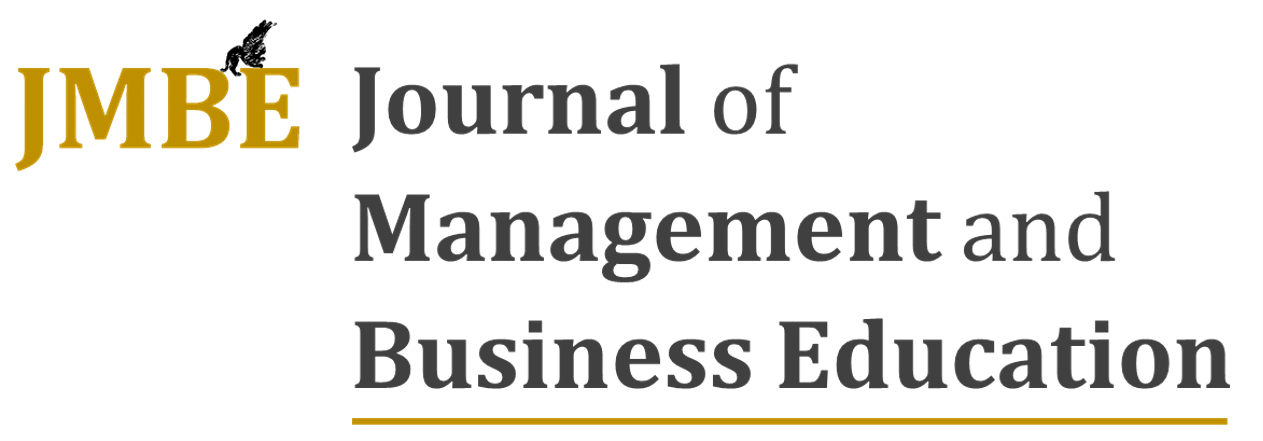Success story in adapting master's teaching to covid-19
DOI:
https://doi.org/10.35564/jmbe.2022.0010Keywords:
teaching, success rate, COVID-19, online, face-to-faceAbstract
In March 2020, the students of the Master's Degree in Financial Advice and Planning (MAPF) at the Rey Juan Carlos University suffered the uncertainty of how the health security restrictions that had to be adopted due to the irruption would affect their academic performance of COVID-19 in Spain. In this study, the evolution of the time series of the success rates of all subjects of this master's degree has been analyzed, taking a study period that begins in normal times and ends after these last two courses affected by COVID-19. The results show that the academic performance of the students in the last two years has not been worse at all, even observing an improvement in the academic performance of the students in the online mode. This can only be interpreted as a success for the university, teachers and students in the face of the challenge posed by the emergence of COVID-19 and the adaptation of teaching.
Downloads
References
Amaya, A., Cantú Cervantes , D. ., & Marreros Vázquez , J. G. . (2021). Análisis de las competencias didácticas virtuales en la impartición de clases universitarias en línea, durante contingencia del COVID-19. Revista de Educación a Distancia (RED), 21(65). https://doi.org/10.6018/red.426371
Area, M. (2020). La enseñanza semipresencial. Mezclando lo presencial y lo virtual. En M. Turull (Coord): Manual de enseñanza universitaria. Barcelona, Octaedro-ICE/UB, pg. 259-270. http://diposit.ub.edu/dspace/bitstream/2445/166737/1/15213-Manual-de-docencia-universitaria-FINAL.pdf https://doi.org/10.4272/978-84-9745-081-2.ch4
Area-Moreira, M., Bethencourt-Aguilar, A., Martín-Gómez, S., & San Nicolás-Santos, M. B. (2021). Análisis de las políticas de enseñanza universitaria en España en tiempos de Covid-19. La presencialidad adaptada. Revista de Educación a Distancia (RED), 21(65). https://doi.org/10.6018/red.450461
Avendaño, William R., Luna, Henry O., & Rueda, Gerson. (2021). Virtual education in times of COVID-19: perceptions of university students. Formación universitaria, 14(5), 119-128. https://doi.org/10.4067/s0718-50062021000500119
Bernardo, J. M. M. (2020). Exámenes no presenciales en época del COVID-19 y el temor al engañ: un estudio de caso en la Universidad de Oviedo. Magister: Revista miscelánea de investigación, 32(1), 102-110. https://doi.org/10.17811/msg.32.1.2020.102-110
Del Castillo, A. (2021). Teaching experience in the social media manager course in a situation of confinement by covid-19. Journal of Management and Business Education, 4(3), 322-337. https://doi.org/10.35564/jmbe.2021.0019
García, M. D. P. Q., Teijón, P. H., & Ocejo, P. G. (2020). La eficacia de la enseñanza a distancia durante el confinamiento por COVID-19 en las zonas de baja cobertura de la España vaciada. El caso de Salamanca. Enseñanza & Teaching: Revista Interuniversitaria de Didáctica, 38(2), 67-85. https://doi.org/10.14201/et20203826785
CNMV (2020) Guía técnica 4/2017 para la evaluación de los conocimientos y competencias del personal que informa y que asesora. Retreived from: https://www.cnmv.es/DocPortal/Legislacion/Guias-Tecnicas/GuiaTecnica_2017_4.pdf
García Aretio, L. (2021). COVID-19 y educación a distancia digital: preconfinamiento, confinamiento y posconfinamiento. RIED. Revista Iberoamericana de Educación a Distancia, 24(1), pp. 09-32. https://doi.org/10.5944/ried.24.1.28080
García-Peñalvo, f. J.; Corell, A. (2020). La CoVId-19: ¿enzima de la transformación digital de la docencia o reflejo de una crisis metodológica y competencial en la educación superior?. Campus Virtuales, 9(2), 83-98. (www.revistacampusvirtuales.es) https://doi.org/10.14201/eks.23013
Grande-de-Prado, M., García-Peñalvo, F. J., Corell, A., & Abella-García, V. (2021). Evaluación en Educación Superior durante la pandemia de la COVID-19. Campus Virtuales, 10(1), 49-58. https://doi.org/10.14201/eks.23086
Hodges, C., Moore, S., Lockee, B., Trust, T., y Bond, A. (2020). La diferencia entre la enseñanza remota de emergencia y el aprendizaje en línea. Educause Review. https://er.educause.edu/articles/2020/3/the-difference-between-em ergency-remote-teaching-and-online-learning
Medina López, A.; Delgado Jalón, ML.; & Cámara Sánchez, A. (2021). Consequences of covid-19 in higher education. Online or presential teaching? Journal of Management and Business Education, 4(3), 275-288. https://doi.org/10.35564/jmbe.2021.0016
Pérez-López, Eva; Vázquez Atochero, Alfonso; Cambero Rivero, Santiago Educación a distancia en tiempos de COVID-19: Análisis desde la perspectiva de los estudiantes universitarios RIED. Revista Iberoamericana de Educación a Distancia, vol. 24, núm. 1, 2021 https://doi.org/10.5944/ried.24.1.27855
Rodriguez Calzada, L. (2021). Learning new innovative methodologies used in covid-19 times. Journal of Management and Business Education, 4(3), 338-353 https://doi.org/10.35564/jmbe.2021.0018
Downloads
Published
How to Cite
Issue
Section
License
Copyright (c) 2023 Journal of Management and Business Education

This work is licensed under a Creative Commons Attribution-NonCommercial-ShareAlike 4.0 International License.
License terms at: https://creativecommons.org/licenses/by-nc/4.0/legalcode




